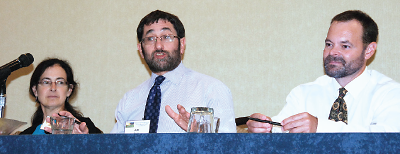Alaska is not only bigger and colder than any other U.S. state, it has disturbingly higher rates of problems associated with mental illness, said David Driscoll, Ph.D., M.P.H., at the National Association for Rural Mental Health’s annual meeting in Washington, D.C., in July.
The suicide rate, for example, is almost twice that of the U.S. population in general—23 per 100,000 versus 12 per 100,000. Among Alaska Natives, the rate is 40 per 100,000. The rate of alcohol-induced death is 19.2 per 100,000 in Alaska compared with 7.6 in the United States in general.
If those statistics aren’t troubling enough, they get even worse in more remote and more northerly parts of the state, possibly because of minimal sunlight during much of the year, said Driscoll, an associate professor of public health and director of the Institute for Circumpolar Health Studies at the University of Alaska Anchorage.
In the state’s vast rural areas, health problems are often made worse by social or economic problems such as the lack of jobs, dependence on subsistence food sources (hunting, fishing), and inadequate law enforcement, added Driscoll’s colleague, epidemiologist Janet Johnston, Ph.D., M.P.H., an assistant professor at the University of Alaska. On top of all that are issues related to the state’s history of colonialism—that is, of outsiders exploiting natural resources and of waves of disease that devastated small native communities.
History, too, determined how Alaska treated its citizens with mental illness. Before the advent of statehood in 1959, mental illness was officially criminalized, pointed out Jeff Jessee, J.D., chief executive officer of the Alaska Mental Health Trust. People with serious mental illness could be convicted of being an “insane person at large” and sent to an asylum in Oregon.
With the transition to statehood, a million acres of land were allotted to the trust to provide income to support mental health services. However, by 1982, only one-third of the trust’s land remained under state control. A subsequent court ruling reconstituted the trust with a full million acres plus an additional $200 million.
Today, there are two primary sources of health care in Alaska’s rural areas. The Indian Health Service funds care for Alaska Natives in more than 30 tribal organizations across the state, and public-health nurses based in 23 communities visit an additional 200 or so other small communities and villages each year. About 180 small village clinics are staffed by 550 community health aides who have the equivalent of an associate’s degree.
“This is the first line of defense for most of the people in rural Alaska, and it amazes me the level of health care they are able to deliver with this training,” said Johnston.
In addition, 125 behavioral health therapists are scattered across the state, the only local mental health services in most rural areas, she noted. There is also a serious dearth of alcohol and substance abuse treatment programs and residential care for children, she said.
At this time, efforts are still required in the state to define a pragmatic approach to mental health service delivery, said Driscoll.
“We need more research that is further along the translational curve,” he said. “We need evidence-based strategies to promote the public’s health today.”
Areas in which Driscoll and Johnston would like to see more research include suicide and violence prevention, alcohol and substance abuse prevention and treatment, and links between mental health and sexually transmitted diseases (whose rates are “off the charts,” said Johnston).
The National Institutes of Health has directly funded only two projects in the state in the last five years, said Johnston.She also spoke ironically of “mosquito research”: researchers fly in, collect blood, and leave, never to be seen again. Such practices have left many rural people wary of all research, making it harder for serious health investigators to establish trust among the population.
Ironically, one of the most successful mental health interventions in recent years has been the trust’s investment in dental health, a choice that grew out of local research, Jessee explained. “People were uncomfortable or in pain, so dental care improved the quality of their mental lives,” he said. ■
More information on the University of Alaska Anchorage’s Institute for Circumpolar Health Studies can be accessed
here.

